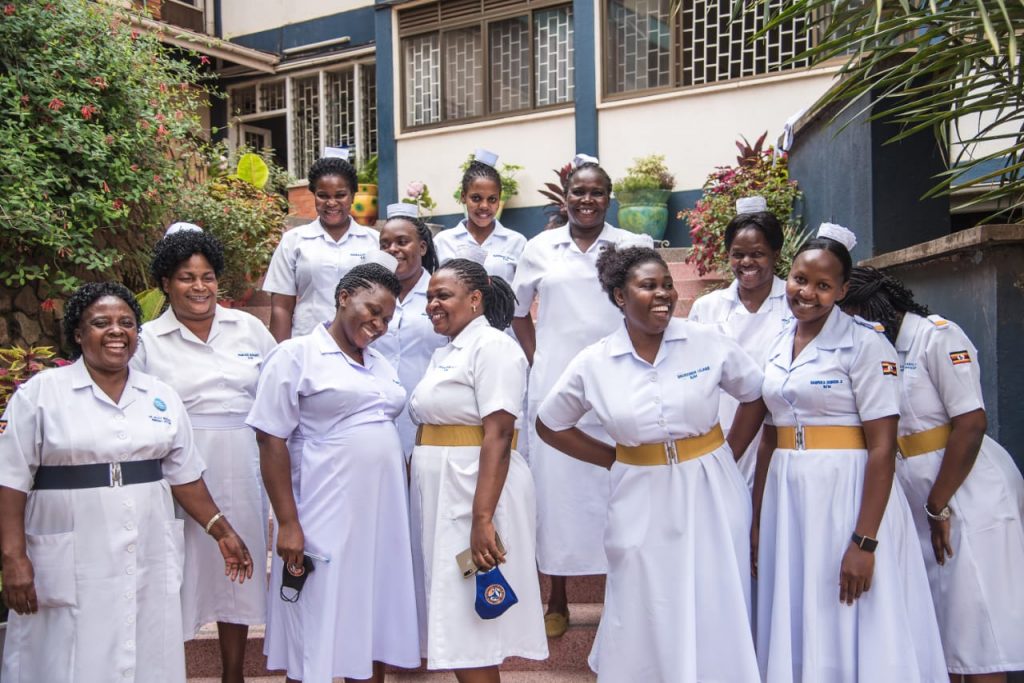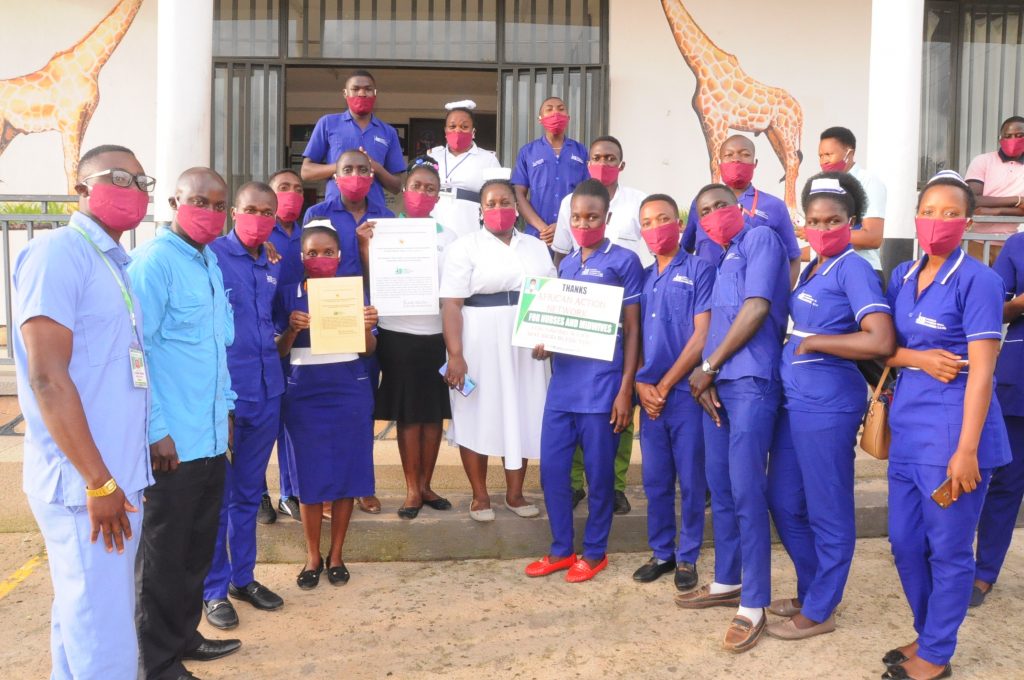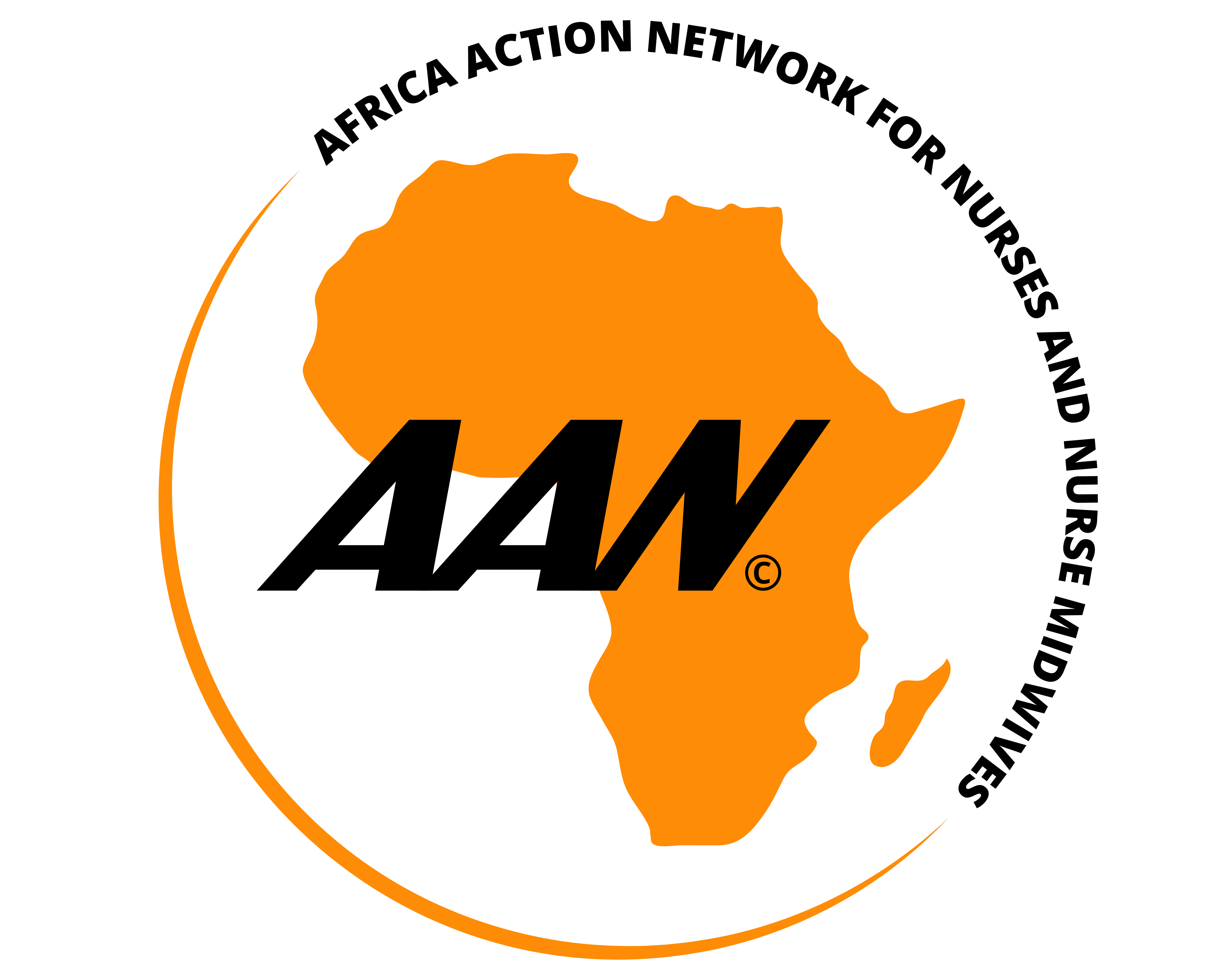About AAN


AAN Project Management
The Africa Action Network (AAN) is a charitable organization set up in the early stages of the COVID pandemic by healthcare professionals and coordinators from 22 countries to fund and provide technical support to Nurse and Nurse-Midwife led projects in Eastern and Southern Africa to Locally produce evidence-based re-useable protective face masks.


AAN Membership
Membership in the AAN network is global in reach and voluntary. Recent developments in the fight to eliminate the virus have underscored the need for a global, unified approach in tackling the pandemic. Failure to do so will result in continued loss of human life, disruption of the social fabric of communities and an increasing global financial burden.
At present, the AAN network consists of several hundred members from 15 countries. Members contribute to network activities professionally, financially, and morally. International solidarity is a core principle.


AAN’s Work To-Date
The principal work of the COVID Africa Action Network for Nurses & Midwives (AAN) is focused on four main targets:
- Developing evidence-based guidelines for local production of reusable medical face masks.
- Funding nurse-led projects for local production & distribution of reusable medical face masks.
- Convening Covid Q&A sessions for healthcare professionals across borders to exchange knowledge and practices in the prevention and treatment of COVID.
- Working with the World Continuing Education Alliance (WCEA) to freely deliver regularly updated COVID courses to nurses and nurse-midwives on the WCEA platform and app.
Timeline 2020
AAN activity began in early March 2020, when the COVID pandemic was raging in Asia, Europe, and the Americas, but just emerging on the African continent. Scientific knowledge, information and PPE was in short supply everywhere, and the evolving challenges for the continent were daunting.
March-April: AAN partnered with the World Continuing Education Alliance (WCEA), to deliver COVID courses to Nurses and Nurse-Midwives free of charge on the WCEA platform and app.
April-may: The AAN Network consulted with global experts, including Dr Janine Jagger, to established evidence-based guidelines for locally made reusable PPE. Dr. Jagger is a renowned expert in PPE and HCW safety. Link to Guidelines
Insert link to DR Q&A with Janine
May / ongoing: AAN initiated ‘China Africa Live’, an online weekly Q&A session linking nurses and doctors in China who were first responders during the Wuhan stage of the pandemic, with healthcare professionals in Eswatini, Uganda, Kenya, Lesotho, Malawi, Rwanda, Somalia, South Africa, Sudan, Tanzania, and Zambia.
Insert photo? Link to YouTube recorded sessions?
May: AAN’s first local PPE project is launched in partnership with the Kampala International University (KIU) School of Nursing, culminating in the production of 130’000 reusable medical masks, donated to Ugandan healthcare facilities in dire need of PPE. Link to PR on Award to students
June: Stop Covid in Africa! Support Nurses! Save Lives! crowdfunding campaign launched – focused on funding projects to locally produce essential PPE for front-line nurses and nurse-midwives.
July: AAN initiated and funded a local PPE production project in partnership with the Malawi Association of Retired Nurses & Midwives and the Malawi Nursing Council., to produce and distribute evidence-based reusable medical masks for HCWs.
September: In partnership with the Rwandan Association of Neonatal Nurses and the Open Arms Golden Years Village, an ANN project to produce evidence-based reusable medical masks for neo-natal nurses, seniors and other vulnerable groups was launched.
October: The AAN Award for Innovation and Sustainability in Health Worker Safety was conferred on the Kampala International University School of Nursing Students’ Association, for its trailblazing work designing & producing 130,000 safe, reusable medical masks for HCWs.
November: Direct Relief and BD awarded a substantial grant to ANN to enable emergency funding and technical support for local production of evidence-based reusable medical facemasks in 11 African countries (Eswatini, Kenya, Lesotho, Malawi, Rwanda, Somalia, South Africa, Sudan, Tanzania, Uganda, and Zambia) during the Covid pandemic.
December: AAN Evidence-Based Guidelines for Locally Produced, Reusable Medical Masks, in cooperation with Dr Janine Jagger of the University of Virginia School of Medicine and published as part of the World Continuing Education Alliance’s CPD resources made freely available to nurses and midwives in LMICs.
TIMELINE 2021
January 2021
Eswatini: AAN initiated funding to the Eswatini Wellness Centre for Health Care Workers to locally produce a total of 25, 000 reusable medical facemasks – 5000 for the Ministry of Education to distribute to schools and 20,000 for the Ministry of Health to distribute health care workers in community and primary health care facilities. The Eswatini Wellness Centre for HCWs provides health care services to health care workers & their families.
February 2021
The KIU School of Nursing and the University of Virginia Faculty of Nursing initiated the AAN International Student Network, aiming to collaborate on a global health curriculum.
In tandem, the Nursing Students’ Association of Uganda launched their own project to manufacture reusable medical facemasks for student nurses and the general public, investing their AAN Award funds to start up this as an ongoing, sustainable enterprise.
March 2021
Somalia: AAN partnered with the Somalian Women Empowerment and Development Organisation (WEDO) to produce and deliver 20 000 reusable medical masks for 5 Health Centres in Mogadishu and 5 Internally Displaced Persons and Refugee camps in Lower Shabelle and Banadir regions. Using its own funds WEDO ran a concurrent COVID education campaign in print, with the key messages on Covid in the Somali Language recommended by World Health Organization and the Somali MoH.
April 2021
Sudan: AAN’s local partner, the International Voluntary Welfare Group (IVWG) based in Khartoum, identified an acute lack of PPE as the main reason that health workers in Sudan abandoned their posts en masse when COVID surged. Estimated infections ranged as high as 8-15 % among health workers, particularly nurses and midwives.
With funding from AAN, IVWG teamed up with a Sudanese self-help women’s group called Zag Rags, who under IVWG supervision started-up production of 20, 000 reusable medical facemasks to supplement government efforts in protecting health workers from infection. IVTG included a bar of soap in each package of two masks given out to nurses and midwives. ZAG Rags plan is to scale the facemask production as a sustainable income generating activity. Support also goes to the Sudanese Critical Nursing Society and the Sudan Nursing Students’ Organisation to distribute the locally made masks to areas outside Khartoum where they are most needed for nurses and midwives and to educate the receivers of the masks on the guidelines for proper use and maintenance
In April 2021 AAN also initiated a partnership with the Rotary International Nurses and Midwives Club, in support of a reusable face mask project in partnership with the Institute of Ubuntu Health and Wellness in South Africa and further linkages with national Rotary Clubs in AAN target countries.
May 2021
Uganda: The Kampala International University Nursing Students Association teamed up with the Uganda Nurses and Midwives Union for the production and distribution of 67, 000 reusable facemasks to nurses and midwives in rural and hard to reach clinics, who in turn supply this protective equipment to smaller to health facilities in their districts that have critical shortages of masks. This is accompanied by an education programme on the guidelines for proper use and maintenance of the facemasks. The project began on 1st May 2021 Expected end date is 30th August 2021.
Zimbabwe: AAN’s local partner, the Zimbabwe Nurses Association (ZINA), is being supported to carry out their project to produce 25,000 reusable face masks (according to AAN guidance) to reduce the Covid exposure rate for nurses in an environment-friendly and sustainable way, aiming to reduce the rate of Covid transmission among nurses and vulnerable populations.
ZINA is also working to establish a sustainable reusable facemask/tailoring workshop for retired nurses, to produce face masks at lower costs and provide a supplementary source of income for retired nurses. A Canadian church group has donated funds to help start this project. A portion of AAN’s funding to ZINA is going to the purchase of sewing machines for this purpose.
In Malawi, our local AAN partners the Retired Nurses Association of Malawi and the Malawi Nurses Council have a new partner to strengthen project implementation. Virginia Thonyiwa is the contact person for a local based organization called Partners in Hope. They have a medical centre in Lilongwe and do project implementation in various districts on HIV and AIDS Gender Based Violence and TB. They also do surgeries for the needy and most vulnerable population.
June 2021
Kenya: The AAN grant to the Reproductive Health Network Kenya (RHNK) is supporting local production of reusable face masks to mitigate the spread of COVID among frontline health care workers within the RHNK network. The 3 layered reusable face masks with bacterial filtration efficiency are being provided to its members across Kenya’s 43 counties, reaching 80% of the nurses and midwives providing essential sexual and reproductive health services to the most vulnerable, facilitating the provision of sexual health services at the community level. Women, girls, and young people will be secondary beneficiaries in the quest to protecting health care workers.
Target: The project targets 500 health facilities (hospitals, clinics, nursing homes), reaching 10,000 Network Nurse/Midwives across the country conducting SRH information and service delivery sessions in the community.
Key stakeholder: The Technical University of Kenya Department of Fashion, Clothing, and Textiles for mass face mask production in accordance with AAN Guidelines; the Kenya ministry of health local standards and quality assurance guidelines; and, the WHO standard for face masks for health care workers.
July 2021
Zambia: AAN’s local partner, Rasangu University School of Health Sciences Dept of Nursing, Lusaka, will produce 145, 000 three-layered face masks for Health Care Workers to supplement government/Rusangu University efforts in the prevention of COVID. The masks will be given free of charge to nurses, midwives, and student nurses, but 30% will be sold to the public, to sustain continued production of reusable facemasks and other PPE products beyond the project life.
The project provides capacity building for the Rusangu University Department of Nursing, in operating a tailoring shop which will extend to production of other PPEs, such as nursing students’ uniforms, aprons, lab coats and any other lab linens.
Lesotho: AAN has partnered locally with the Lesotho Nursing Council (LNC) to produce 15,000 face masks, out of which 10,500 will be distributed by the Lesotho Nursing Council (LNC) to all the 4 CHAL Nurse Training Institutions.
- The primary beneficiaries for this project are the nursing/midwifery students and their Educators in the four (4) respective CHAL training institutions who will be given 70% of the face masks for free, while the remaining 30% of the face masks will be sold to other nursing and midwifery personnel and the communities. These r face masks will be socially marketed at the low cost of M10,00 affordable to all, and the revenue generated from the sales will contribute to continued mask production and continued sales.
South Africa: AAN’s primary local partner, the Institute of Ubantu Health & Wellness, will receive funding to work with a youth group and retired nurses to produce 6500 masks.
AAN Reusable Facemask Testing Programme
- Nelson Laboratories www.nelsonlabs.com A leading global provider of laboratory testing and expert advisory services www.nelsonlabs.com
Samples from Eswatini, Kenya, and Uganda were sent in July for the following tests:
- Bacterial filtration efficiency – BFE 101C
- Synthetic blood penetration – SBP 210C
- Kenya Bureau of Standards -KEBS www.kebs.org A National Standards Body with an overall mandate to promote standardization in industry and trade through standards development, conformity assessment, testing, and metrology
Samples from all AAN projects are to be sent in July for the following tests:
- Microbial cleanliness
- Differential pressure (breathability) at a later date
- Technical University of Kenya http://tukenya.ac.ke/ Mission is to provide technological education and training and to contribute towards the advancement of society through research and innovation
Samples from all AAN projects are to be sent in July to Dr. Edison Omollo Oduor, TUK Faculty of Fashion, Clothing, and Textiles for the following:
- Determination of the technical parameters of the fabrics used in making facemasks using ‘AAN’ Guidelines & Recommendations – weave type, thread density, warp and weft count.
- Analysis and advice on engineering advancements
